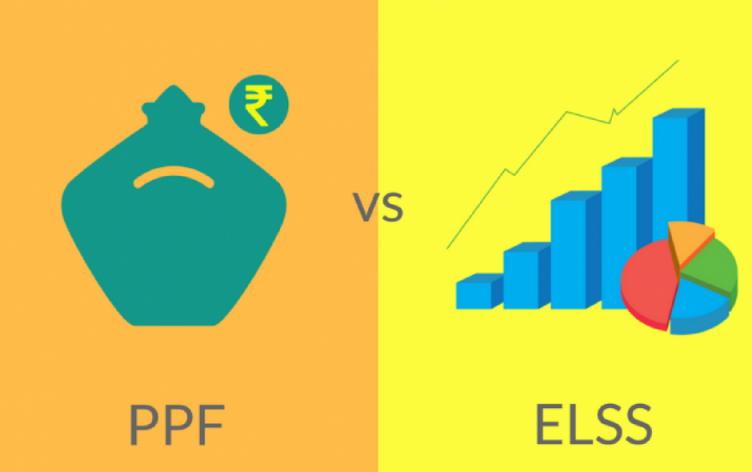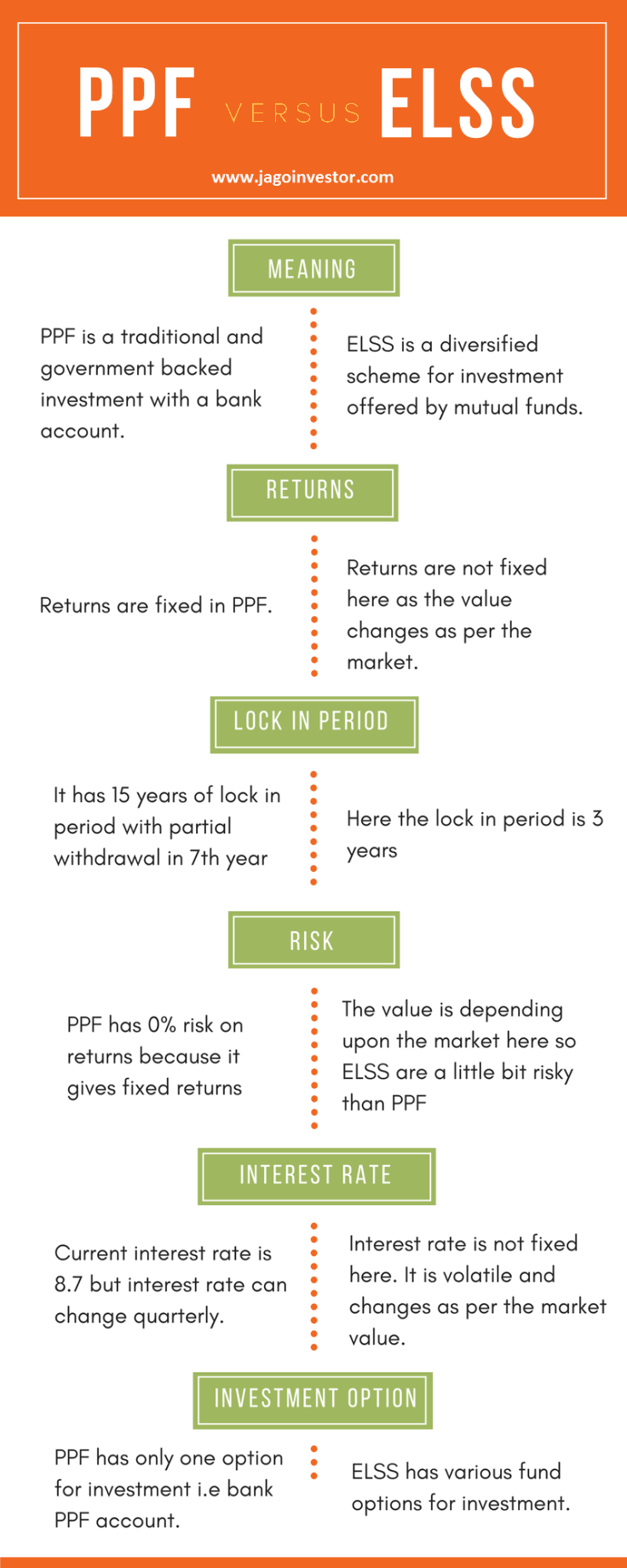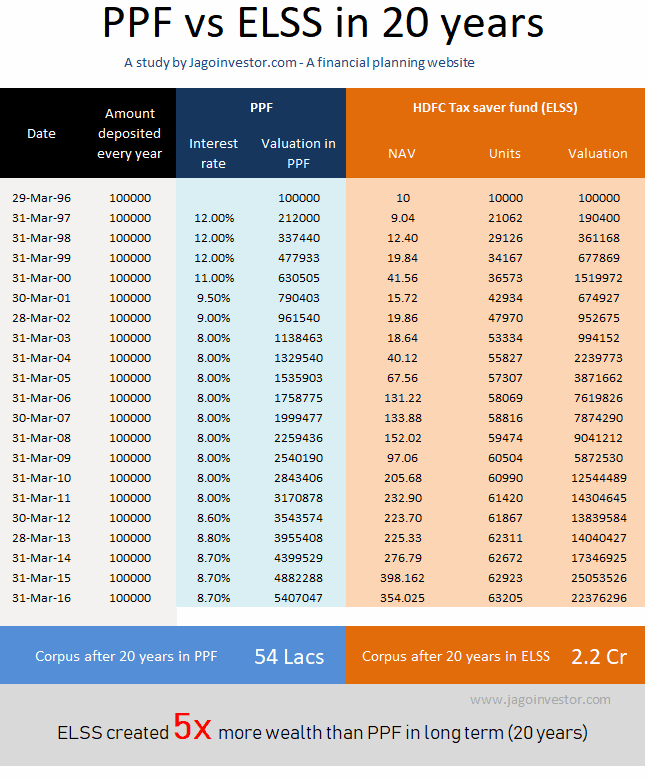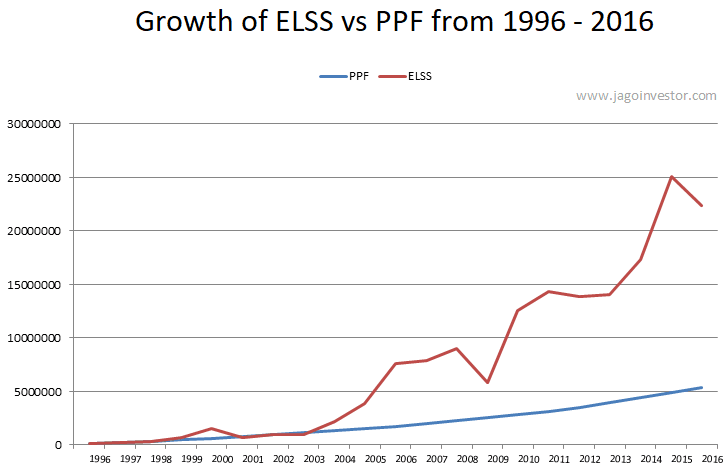ELSS vs PPF – where to invest for your tax saving? (20 yrs data)
Most of the people who want to do tax saving in 80C are confused if they should invest in PPF or ELSS (tax saving mutual funds). Both PPF and ELSS offer taxation benefits of upto Rs 1.5 lacs under sec 80C.

ELSS vs PPF – Meaning
Lets start with their meaning and what exactly they are.
PPF means public providend fund. Its a govt scheme which is run by post office and its a very safe financial product. There is no risk to it because its guranteed by govt of India. Its quite famous among investors for its safety and assured returns.
On the other hand ELSS (Equity linked saving scheme) is fairly new financial product in India (from last 15 yrs). Its mainly a equity mutual fund which gives you income tax benefit. Equity mutual funds mainly invest in stocks of companies, which makes sure that they deliver high returns, but at the same time they are risky (actually volatile) and their returns keep going up and down.
Now, lets compare PPF and ELSS on various parameters.
#1 – Returns
The returns in PPF change every year and its around 7.5-8% . Right now its 7.8% and it keeps on changing from time to time whichis notified by govt. Earliar many years back, PPF returns were in range of 12% and then it came down to 9%. But from last few years, its hovering around 8%.
Incase of ELSS, its linked to market and the returns are not fixed in short term. Some years it can be 20% , some times it can be 50% and in some years it can be -25% also . So you can see that the returns are totally dependent on stock markets and how well they perform. However in a long term, you can be assured that you will get a return in range of 12-18%. The returns are not at all guaranteed by anyone.
#2 – Lock in Period
Your PPF investments are locked in for 15 yrs, but some partial money can be withdrawn after 7 yrs. So basically its a very long term product, and if you are investing in PPF, you should be ready to lock you money for a very long time. After 15 yrs, you can again extend your PPF for another 5 yrs (any number of time) and you money will again be locked for that 5 yrs.
On the other hand, ELSS have a lock in for just 3 yrs. You can take out your money after 3 yrs. Important point to note here is that each investment is locked in for 3 yrs, so if you have an SIP running in ELSS fund, then each installment is locked for 36 months.
So if you want money in 4-5 yrs, ELSS is a better choice compared to PPF from liquidity point of view.
#3 – RISK
PPF is not at all risky because its value does not go down. PPF is also guranteed by govt, so there are no changes of fraud. If you plot the graph of your PPF value, you will see a straight line going up .. However note that PPF has a totally different kind of risk, which is that does not give inflation adjusted positive returns. Means that its returns match the inflation and at the end, you do not have any net returns.
On the other hand ELSS are volatile, which is often reffered to as “RISK” . The value of ELSSS keeps going up and down depending the stock market movements. In the short term you might experience a down turn and loss in value, but over a longer term, you will see good results.
As most of the investors are risk averse and do not like to see a dip in value of their investments, most of the investors stay away from ELSS or stocks in general, and loose the chance to experience great returns at the same time.
#4 – Taxation
PPF is tax free. There is no tax on PPF returns. Whatever returns you get in PPF are 100% tax exempt.
Earliar ELSS was also tax exempt after 1 yr, but with budget 2017-2018, now any gains in equity mutual funds or stocks are taxable @10% when you sell them, but you get an exemption of Rs 1 lac per yr. Which means that if your profit after selling ELSS is 4 lacs, then you have to pay 10% tax on 3 lacs. However even after this taxation, the post tax returns of ELSS are much better than any other investment option.
Here is an infographic which shows you a quick comparision between PPF and ELSS.

How to invest in PPF or ELSS?
If you want to invest in PPF account, you can open a PPF account in a post office or any bank (generally SBI is very famous for PPF). Note that it does not matter where you are opening your PPF account, if you open with post office, SBI, or ICICI .. at all the places you are going to get the same interest because ultimately its controlled by POST OFFICE only.
The banks are just a medium to invest and nothing else.
If you want to invest in ELSS, then you can choose any fund house (there are many AMC like ICICI , HDFC, SBI, Motilal Oswal etc). You can either go to their website directly or contact an advisor (You can also invest in ELSS through Investrack help)
Returns of ELSS and PPF from last 20 years
Its important to check how PPF and ELSS have performed in last 20 yrs (1996 – 2016) so that you get a fair idea on their performance and which one is better from a long term point of view. So we took one of the famour ELSS (HDFC Tax Saver) as an example along with PPF and calculated how the value in both will increase over time if someone invests Rs 1 lac in both the financial product.

In the above table you can see that Rs 1 lac of yearly investment for 20 yrs have accumulated to Rs 54 lacs in PPF, where as it become 2.2 crores in the ELSS, which means that ELSS gave 5 times more returns than PPF.
However this difference is more visible only after 10 yrs passed and compounding starts kicking in.
In the initial years, there was no big difference in their values. See the graph given below. You will get a clear idea of how ELSS has performed incredibly towards the end of tenure.

Important Note :
The example of HDFC Tax Saver is taken only for the illustration purpose. This is not a recommendation, and right now HDFC Tax saver is not the best option for tax saving. There are many other ELSS funds which can be choosen other than HDFC Tax saver. Kindly Contact your Financial Advisor for any recommendations.
So after studying the table data and graph, I hope it becomes easier for you to know the difference between the returns from PPF and ELSS investments. If you still have any confusion or any doubt in your mind, feel free to ask us by leaving your query in our comment section.
Comments
Post a Comment